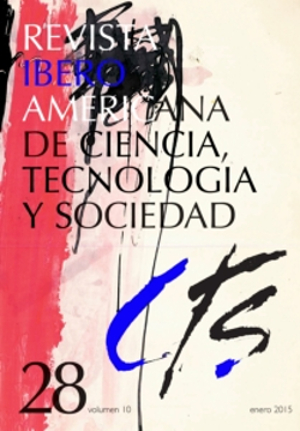From the philosophy of science to the philosophy of technosciences and innovations
DOI:
https://doi.org/10.52712/issn.1850-0013-566Keywords:
philosophy of science, STS studies, scientific practice, innovation studiesAbstract
This article is based on the assumption that at the end of the 20th century emerged a new form of science, techno-science, which presents technological, economic, political, business, and even military dimensions apart from the strictly scientific one. Techno- science is not limited to describe or explain the world, but rather to transform it. The search for knowledges is subject to the achievement of innovations. Therefore, as well as philosophy of science is needed a philosophy of techno-science and a philosophy of innovation derived from it, because the systems of ID (research and development) are today geared to innovate. For this purpose there is to develop new lines of research: philosophy of scientific practice, philosophy of techno-culture and political philosophy of science, apart from an axiology and a praxeology of science. To argue these proposals three examples of new social and human technos-ciences are commented (cloud computing, systems of indicators and human neurosciences). Furthermore, it is proposed the notion of techno-paradigm, which regulates the contemporary techno- agendas and the way of doing science in the 21st century.
Downloads
References
BUSH, V. (1945): Science, the Endless Frontier, Washington, Government Printing Office.
CASTELLS, M. (1996-98): La Era de la Información, Madrid, Alianza.
ECHEVERRÍA, J. (2003): La revolución tecnocientífica, Madrid/México, FCE.
ECHEVERRÍA, J. (2007): “Towards a Philosophy of Scientific Practice: From Scientific Theories to Scientific Agendas”, en F. Minazzi (ed.): Filosofia, Scienza e Bioetica nel dibattito contemporaneo, Roma, Instituto Poligrafico e Zecca dello Staa, pp. 511-524.
ECHEVERRÍA, J. (2012): “Technomathematical models in Social Sciences”, en M. Weber, D. Dieks, W. J. González, S. Hartman, F. Stadler y M. Stältzner (eds.): Probabilities, Laws, and Structures, Springer, Dordrecht, PSE, pp. 347-360.
ECHEVERRÍA, J. (2013): Entre cavernas: de Platón al cerebro pasando por Internet, Madrid, Triacastela.
ECHEVERRÍA, J. (2014): Innovation and Values: a European Perspective, University of Nevada, Center for Basque Studies.
ESTEBAN, J. M. y MARTÍNEZ, S. (2008): Normas y Prácticas en la Ciencia, México DF, UNAM, Instituto de Investigaciones Filosóficas.
EUROPEAN COMMISSION (2004): Nanotechnologies: A Preliminary Risks Analysis, Brussels, Community Health and Consumer Protection.
GIBBONS, M.; LIMOGES, C.; NOWOTNY, H.; SCHWARTZMAN, S.; SCOTT, P. y TROW, M. (1994): The new production of knowledge: the dynamics of science and research in contemporary societies, Londres, Sage.
JASANOFF, S. (1995): Science at the Bar, Cambridge, Harvard University Press.
LATOUR, B. (1987): Science in Action, Cambridge, Harvard University Press.
MARCOS, A. (2010): Ciencia y acción. Una filosofía práctica de la ciencia, Reno, NV, University of Nevada Reno, Center for Basque Studies. la NSF (2002),cientáctica de la ciencia, México DF, FCE.
MARTÍNEZ, S. (2005): Geografía de las prácticas científicas, México, UNAM, Instituto de Investigaciones Filosóficas.
OECD (2002): Frascati Manual, Proposed Standard Practice for Surveys on Research and Experimental Development, París.
OECD/EUROSTAT (2005): Oslo Manual: Guideliness for Collecting and Interpreting Innovation Data.
OLIVÉ, L. (2007): La ciencia y la tecnología en la sociedad del conocimiento, México DF, FCE.
RICYT/OEA/CYTED (2001): Standardization of Indicators of Technological Innovation in Latin American and Caribbean Countries: Bogotá Manual, Buenos Aires.
ROCCO, M. y BAINBRIDGE, W. S. (2002): Converging Technologies for Improving Human Performance, National Science Foundation.
VELASCO, A. y LÓPEZ BELTRÁN, C. (2013): Aproximaciones a la filosofía política de la ciencia, México, UNAM.
ZIMAN, J. (2000): Real Science. What it is and what it means, Cambridge University Press.
Downloads
Published
How to Cite
Issue
Section
License
Copyright (c) 2024 CC Attribution 4.0

This work is licensed under a Creative Commons Attribution 4.0 International License.
All CTS's issues and academic articles are under a CC-BY license.
Since 2007, CTS has provided open and free access to all its contents, including the complete archive of its quarterly edition and the different products presented in its electronic platform. This decision is based on the belief that offering free access to published materials helps to build a greater and better exchange of knowledge.
In turn, for the quarterly edition, CTS allows institutional and thematic repositories, as well as personal web pages, to self-archive articles in their post-print or editorial version, immediately after the publication of the final version of each issue and under the condition that a link to the original source will be incorporated into the self-archive.











